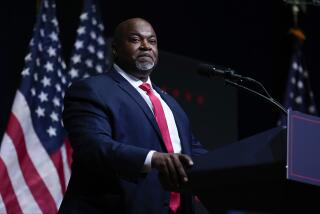Putting a Campaign Trick to Voters’ Use
- Share via
Few people are happy with the way we elect our political leaders these days.
Politicians aren’t happy because they have to spend so much of their time passing a hat. Either that or answering cattle calls and defending against inane accusations. Some of the best political leaders don’t even run anymore.
Voters surely aren’t happy. They say they’re so confused by the process that it’s almost impossible to make an educated decision. For many, politics is probably that thing that fills the mailbox with junk. Some of the best voters probably don’t vote anymore.
Reporters aren’t happy because they’re yanked from this defense-plant tour to that American flag factory. Either that or trying to decipher the inane accusations. Some of the best political reporters don’t even cover campaigns anymore.
About the only people who might be happy are the campaign managers who have become rich by learning to flourish in the status quo. But then, they won’t live long. That’s truly a job for a Rolaids commercial.
Clearly, the public interest could be better served. And although the wheels of progress grind exceedingly slowly on this issue, it is getting more attention.
Lawmakers in Washington have proposed publicly financed campaigns, guaranteed free television time, spending limits and tighter restrictions on contributions.
Voters in California have decided to just throw the bums out every few years.
As for reporters, I think the wheels have turned even more slowly. In the book “Boys on the Bus,” Timothy Crouse described how pack journalism had diluted independent thinking in the 1972 presidential campaign. Nearly 20 years later, the observation is just as accurate.
In fact, campaign coverage isn’t much different than it was 100 years ago. A politician makes a speech; a reporter writes what he or she says. The problem is that the politician usually doesn’t say what the voter needs to hear.
Campaign strategists have become extremely adept at exploiting the media’s weaknesses, especially since Ronald Reagan’s 1980 presidential race. Contrary to what most people may think, the strategists have learned that the media is really much more of a follower than a leader.
Lately though, editors and reporters nationwide have been conducting their own self-examination--considering their vulnerability to manipulation and assessing the goal of a complete and accurate portrayal of the men and women who seek office.
To that discussion, I’d like to add a proposal. I think reporters should take a page right out of the book that campaign managers have written so well.
In 1988, George Bush’s campaign featured scheduled theme days. On education day, for example, each event, each speech and each press release focused on education. If a reporter asked a question about abortion, the answer somehow got back to education.
The point was to be as certain as possible that the evening news shows or the next day’s newspapers carried something about the candidate’s position on education.
For the campaign, it was a way to have some control over the news. I think the media need to regain control over the campaign agenda, and I think it could be done with theme weeks .
During education week, for example, there might be a story on Sunday written from the classroom about problems facing schools. On Monday, there could be a story written from the halls of government about proposed legislation and the arguments from various sides. Then, from the campaign trail, additional stories could evaluate the candidates.
The point is to make the process voter-driven, not candidate-driven. Most candidates will avoid giving opinions on tough issues because they know that the one who wins is usually not the most loved but the least hated.
With theme weeks, I think a lot of candidates would be more forthcoming, confident that their opponents would receive the same scrutiny. And if the idea caught on, campaigns might schedule their own announcements around the theme weeks.
Someday a campaign staffer might even call a reporter and ask, “Now when was environment week again?”
More to Read
Get the L.A. Times Politics newsletter
Deeply reported insights into legislation, politics and policy from Sacramento, Washington and beyond. In your inbox twice per week.
You may occasionally receive promotional content from the Los Angeles Times.










